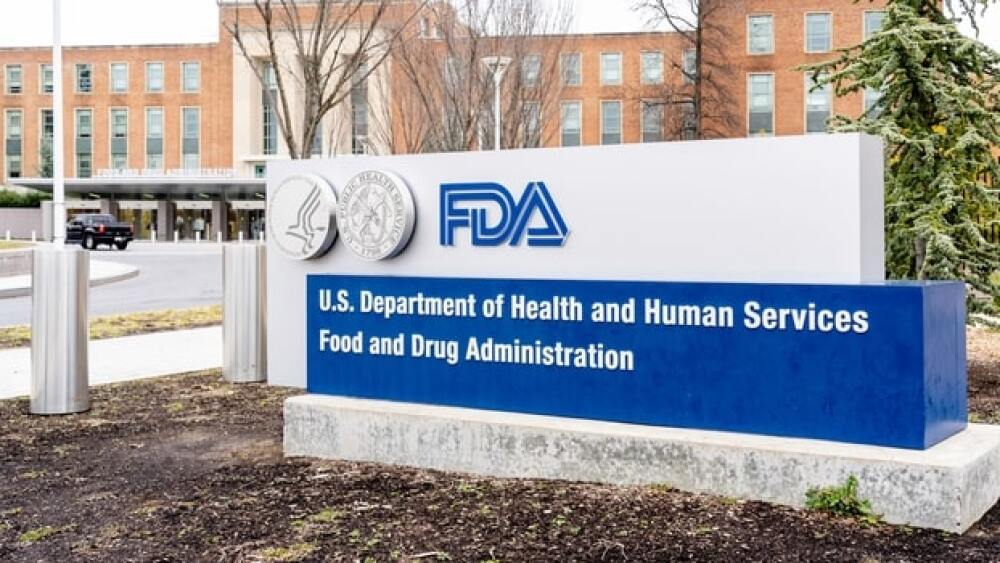The Janssen Pharmaceutical Companies of Johnson & Johnson today announced that the U.S. Food & Drug Administration (FDA) has approved AKEEGA™ (niraparib and abiraterone acetate), the first-and-only dual action tablet combining a PARP inhibitor with abiraterone acetate, given with prednisone, for the treatment of adult patients with deleterious or suspected deleterious BRCA-positive mCRPC, as detected by an FDA-approved test.
|
Approval is based on the Phase 3 MAGNITUDE study, a prospectively designed precision medicine study including the largest population of BRCA-positive patients in combination trials to date with metastatic castration-resistant prostate cancer (mCRPC) AKEEGA™ plus prednisone significantly improved radiographic progression-free survival compared to abiraterone acetate plus prednisone (AAP) in patients with BRCA-positive mCRPC HORSHAM, Pa., Aug. 11, 2023 /PRNewswire/ -- The Janssen Pharmaceutical Companies of Johnson & Johnson today announced that the U.S. Food & Drug Administration (FDA) has approved AKEEGA™ (niraparib and abiraterone acetate), the first-and-only dual action tablet combining a PARP inhibitor with abiraterone acetate, given with prednisone, for the treatment of adult patients with deleterious or suspected deleterious BRCA-positive mCRPC, as detected by an FDA-approved test.1 "As a physician, identifying patients with a worse prognosis is a priority, especially those whose cancers have a BRCA mutation," said Kim Chi, M.D.*, Medical Oncologist at BC Cancer – Vancouver and principal investigator of the Phase 3 MAGNITUDE study. "We prospectively designed the MAGNITUDE study to identify the subset of patients most likely to benefit from targeted treatment with AKEEGA and to help us understand how we can potentially achieve better health outcomes for patients." Prostate cancer is one of the most common cancers in the U.S., with an estimated 288,300 new cases and nearly 35,000 deaths expected in 2023.2 Approximately 10 to 15 percent of patients with mCRPC have BRCA gene alterations. Patients with BRCA-positive mCRPC are more likely to have aggressive disease and may experience poor outcomes and a shorter survival time.3,4,5,6,7 "The approval of AKEEGA brings an important treatment option to patients with prostate cancer as they consider their road ahead, and it also highlights the importance of genetic testing and precision medicine for this disease," said Shelby Moneer, MS, CHES**, Vice President of Patient Programs and Education, ZERO Prostate Cancer. "All individuals diagnosed with prostate cancer should consider genetic testing, especially those from racial and ethnic minority groups who tend to have worse cancer outcomes. This is imperative to close the racial and ethnic disparities in prostate cancer health outcomes." The FDA approval is based on positive results from the randomized, double-blind, placebo-controlled multi-center Phase 3 MAGNITUDE study. In BRCA-positive patients treated with the combination AKEEGA™ plus prednisone, a statistically significant 47 percent risk reduction was observed for radiographic progression-free survival (rPFS) (Hazard ratio [HR], 0.53; p=0.001). At the second interim analysis (IA2), with median follow-up at 24.8 months in the BRCA-positive subgroup, rPFS by central review demonstrated a consistent trend favoring AKEEGA™ plus prednisone, with a median rPFS of 19.5 months compared with 10.9 months for placebo and AAP (HR, 0.55 [95 percent confidence interval (CI), 0.39-0.78]). Additionally, there was an observed improvement in the secondary endpoints of time to symptomatic progression (TSP) (HR, 0.54 [95 percent CI, 0.35-0.85]) and time to initiation of cytotoxic chemotherapy (TCC) (HR, 0.56 [95 percent CI, 0.35-0.90]) for AKEEGA™ plus prednisone compared with AAP alone, supported by a trend towards improvement in overall survival (OS) (HR, 0.88 [95 percent CI, 0.58-1.34]). The observed safety profile of the combination of AKEEGA™ plus prednisone was consistent with the known safety profile of each FDA-approved monotherapy. Of the patients in the MAGNITUDE study with a BRCA gene alteration, 41 percent who received AKEEGA™ experienced a serious adverse event (AE). The most common AEs occurring in 20 percent or more of patients who received AKEEGA™ plus prednisone versus patients who received placebo and AAP were musculoskeletal pain (44 percent vs. 42 percent, respectively), fatigue (43 percent vs. 30 percent), constipation (34 percent vs. 20 percent), hypertension (33 percent vs. 27 percent) and nausea (33 percent vs. 21 percent). Permanent discontinuation of any component of AKEEGA™ due to an adverse reaction occurred in 15 percent of patients. "Janssen's legacy of advancing the science of prostate cancer has contributed to the evolution of transformational treatment approaches for more than a decade," said Kiran Patel, M.D., Vice President, Clinical Development, Solid Tumors, Janssen Research & Development, LLC. "This milestone, which marks the approval of Janssen's third prostate cancer treatment, highlights the importance of advancing precision medicine approaches and genetic testing for the treatment of patients with BRCA-positive mCRPC." About AKEEGA™ In April 2016, Janssen Biotech, Inc. entered a worldwide (except Japan) collaboration and license agreement with TESARO, Inc. (acquired by GlaxoSmithKline [GSK] in 2019) for exclusive rights to niraparib in prostate cancer. About Metastatic Castration-Resistant Prostate Cancer About MAGNITUDE The study included patients with (HRR biomarker [BM] positive; ATM, BRCA1, BRCA2, BRIP1, CDK12, CHEK2, FANCA, HDAC2, PALB2) and without specified gene alterations (HRR BM negative), who were randomized 1:1 to receive niraparib 200 mg once daily plus AAP or placebo plus AAP.8 A total of 423 patients with HRR gene alterations were enrolled, 225 (53.2 percent) of whom had BRCA mutations.9,10,11 The primary endpoint of the MAGNITUDE trial was rPFS assessed by blinded independent central review.12 Secondary endpoints included TCC, TSP and OS. Analysis of the group of patients with BRCA alterations was alpha controlled for rPFS and prespecified for other endpoints. Access to AKEEGA™ (niraparib and abiraterone acetate) IMPORTANT SAFETY INFORMATION FOR AKEEGA™ WARNINGS AND PRECAUTIONS Myelodysplastic Syndrome/Acute Myeloid Leukemia MDS/AML, including cases with fatal outcome, has been observed in patients treated with niraparib, a component of AKEEGA™. All patients treated with niraparib who developed secondary MDS/cancer-therapy-related AML had received previous chemotherapy with platinum agents and/or other DNA-damaging agents, including radiotherapy. For suspected MDS/AML or prolonged hematological toxicities, refer the patient to a hematologist for further evaluation. Discontinue AKEEGA™ if MDS/AML is confirmed. Myelosuppression In MAGNITUDE Cohort 1, Grade 3-4 anemia, thrombocytopenia, and neutropenia were reported, respectively in 28%, 8%, and 7% of patients receiving AKEEGA™. Overall, 27% of patients required a red blood cell transfusion, including 11% who required multiple transfusions. Discontinuation due to anemia occurred in 3% of patients. Monitor complete blood counts weekly during the first month of AKEEGA™ treatment, every two weeks for the next two months, monthly for the remainder of the first year and then every other month, and as clinically indicated. Do not start AKEEGA™ until patients have adequately recovered from hematologic toxicity caused by previous therapy. If hematologic toxicities do not resolve within 28 days following interruption, discontinue AKEEGA™ and refer the patient to a hematologist for further investigations, including bone marrow analysis and blood sample for cytogenetics. Hypokalemia, Fluid Retention, and Cardiovascular Adverse Reactions In MAGNITUDE Cohort 1, which used prednisone 10 mg daily in combination with AKEEGA™, Grades 3-4 hypokalemia was detected in 2.7% of patients on the AKEEGA™ arm and Grades 3-4 hypertension were observed in 14% of patients on the AKEEGA™ arm. The safety of AKEEGA™ in patients with New York Heart Association (NYHA) Class II to IV heart failure has not been established because these patients were excluded from MAGNITUDE. Monitor patients for hypertension, hypokalemia, and fluid retention at least weekly for the first two months, then once a month. Closely monitor patients whose underlying medical conditions might be compromised by increases in blood pressure, hypokalemia, or fluid retention, such as those with heart failure, recent myocardial infarction, cardiovascular disease, or ventricular arrhythmia. Control hypertension and correct hypokalemia before and during treatment with AKEEGA™. Discontinue AKEEGA™ in patients who develop hypertensive crisis or other severe cardiovascular adverse reactions. Hepatotoxicity Hepatotoxicity in patients receiving abiraterone acetate, a component of AKEEGA™, has been reported in clinical trials. In post-marketing experience, there have been abiraterone acetate-associated severe hepatic toxicity, including fulminant hepatitis, acute liver failure, and deaths. In MAGNITUDE Cohort 1, Grade 3-4 ALT or AST increases (at least 5 x ULN) were reported in 1.8% of patients. The safety of AKEEGA™ in patients with moderate or severe hepatic impairment has not been established as these patients were excluded from MAGNITUDE. Measure serum transaminases (ALT and AST) and bilirubin levels prior to starting treatment with AKEEGA™, every two weeks for the first three months of treatment and monthly thereafter. Promptly measure serum total bilirubin, AST, and ALT if clinical symptoms or signs suggestive of hepatotoxicity develop. Elevations of AST, ALT, or bilirubin from the patient's baseline should prompt more frequent monitoring and may require dosage modifications. Permanently discontinue AKEEGA™ for patients who develop a concurrent elevation of ALT greater than 3 x ULN and total bilirubin greater than 2 x ULN in the absence of biliary obstruction or other causes responsible for the concurrent elevation, or in patients who develop ALT or AST ≥20 x ULN at any time after receiving AKEEGA™. Adrenocortical Insufficiency Adrenocortical insufficiency has been reported in clinical trials in patients receiving abiraterone acetate, a component of AKEEGA™, in combination with prednisone, following interruption of daily steroids and/or with concurrent infection or stress. Monitor patients for symptoms and signs of adrenocortical insufficiency, particularly if patients are withdrawn from prednisone, have prednisone dose reductions, or experience unusual stress. Symptoms and signs of adrenocortical insufficiency may be masked by adverse reactions associated with mineralocorticoid excess seen in patients treated with abiraterone acetate. If clinically indicated, perform appropriate tests to confirm the diagnosis of adrenocortical insufficiency. Increased doses of corticosteroids may be indicated before, during, and after stressful situations. Hypoglycemia Severe hypoglycemia has been reported when abiraterone acetate, a component of AKEEGA™, was administered to patients receiving medications containing thiazolidinediones (including pioglitazone) or repaglinide. Monitor blood glucose in patients with diabetes during and after discontinuation of treatment with AKEEGA™. Assess if antidiabetic drug dosage needs to be adjusted to minimize the risk of hypoglycemia. Increased Fractures and Mortality in Combination with Radium 223 Dichloride The clinical efficacy and safety of concurrent initiation of abiraterone acetate plus prednisone/prednisolone and radium Ra 223 dichloride was assessed in a randomized, placebo-controlled multicenter study (ERA-223 trial) in 806 patients with asymptomatic or mildly symptomatic castration-resistant prostate cancer with bone metastases. The study was unblinded early based on an Independent Data Monitoring Committee recommendation. At the primary analysis, increased incidences of fractures (29% vs 11%) and deaths (39% vs 36%) have been observed in patients who received abiraterone acetate plus prednisone/prednisolone in combination with radium Ra 223 dichloride compared to patients who received placebo in combination with abiraterone acetate plus prednisone. It is recommended that subsequent treatment with Ra-223 not be initiated for at least five days after the last administration of AKEEGA™, in combination with prednisone. Posterior Reversible Encephalopathy Syndrome PRES has been observed in patients treated with niraparib as a single agent at higher than the recommended dose of niraparib included in AKEEGA™. Monitor all patients treated with AKEEGA™ for signs and symptoms of PRES. If PRES is suspected, promptly discontinue AKEEGA™ and administer appropriate treatment. The safety of reinitiating AKEEGA™ in patients previously experiencing PRES is not known. Embryo-Fetal Toxicity Niraparib has the potential to cause teratogenicity and/or embryo-fetal death since niraparib is genotoxic and targets actively dividing cells in animals and patients (e.g., bone marrow). In animal reproduction studies, oral administration of abiraterone acetate to pregnant rats during organogenesis caused adverse developmental effects at maternal exposures approximately ≥ 0.03 times the human exposure (AUC) at the recommended dose. Advise males with female partners of reproductive potential to use effective contraception during treatment and for 4 months after the last dose of AKEEGA™. Females who are or may become pregnant should handle AKEEGA™ with protection, e.g., gloves. Based on animal studies, AKEEGA™ may impair fertility in males of reproductive potential. ADVERSE REACTIONS The most common adverse reactions (≥10%), including laboratory abnormalities, are decreased hemoglobin, decreased lymphocytes, decreased white blood cells, musculoskeletal pain, fatigue, decreased platelets, increased alkaline phosphatase, constipation, hypertension, nausea, decreased neutrophils, increased creatinine, increased potassium, decreased potassium, increased AST, increased ALT, edema, dyspnea, decreased appetite, vomiting, dizziness, COVID-19, headache, abdominal pain, hemorrhage, urinary tract infection, cough, insomnia, increased bilirubin, weight decreased, arrhythmia, fall, and pyrexia. Serious adverse reactions reported in >2% of patients included COVID-19 (7%), anemia (4.4%), pneumonia (3.5%), and hemorrhage (3.5%). Fatal adverse reactions occurred in 9% of patients who received AKEEGA™, including COVID-19 (5%), cardiopulmonary arrest (1%), dyspnea (1%), pneumonia (1%), and septic shock (1%). DRUG INTERACTIONS Effect of Other Drugs on AKEEGA™ Abiraterone is a substrate of CYP3A4. Strong CYP3A4 inducers may decrease abiraterone concentrations, which may reduce the effectiveness of abiraterone. Effects of AKEEGA™ on Other Drugs Abiraterone is a CYP2D6 moderate inhibitor. AKEEGA™ increases the concentration of CYP2D6 substrates, which may increase the risk of adverse reactions related to these substrates. Monitor patients for signs of toxicity related to a CYP2C8 substrate for which a minimal change in plasma concentration may lead to serious or life-threatening adverse reactions. Abiraterone is a CYP2C8 inhibitor. AKEEGA™ increases the concentration of CYP2C8 substrates, which may increase the risk of adverse reactions related to these substrates. Please see the full Prescribing Information for AKEEGA™. *Dr. Chi has been a paid consultant to Janssen; Dr. Chi has not been paid for any media work. About the Janssen Pharmaceutical Companies of Johnson & Johnson Learn more at www.janssen.com. Follow us at @JanssenGlobal and @JanssenUS. Janssen Biotech, Inc. and Janssen Research & Development, LLC are part of the Janssen Pharmaceutical Companies of Johnson & Johnson. Cautions Concerning Forward-Looking Statements 1 AKEEGA Prescribing Information. Horsham, PA: Janssen Biotech, Inc. 2 American Cancer Society. Cancer Facts & Figures 2023. Accessed May 11, 2023. https://www.cancer.org/content/dam/cancer-org/research/cancer-facts-and-statistics/annual-cancer-facts-and-figures/2023/2023-cancer-facts-and-figures.pdf 3 Scott RJ, Mehta A, Macedo GS, Borisov PS, Kanesvaran R, El Metnawy W. Genetic testing for homologous recombination repair (HRR) in metastatic castration-resistant prostate cancer (mCRPC): challenges and solutions. Oncotarget. 2021 Aug 3;12(16):1600-1614. doi: 10.18632/oncotarget.28015. PMID: 34381565; PMCID: PMC8351605. Available at: https://www.ncbi.nlm.nih.gov/pmc/articles/PMC8351605/ 4 Castro E, Romero-Laorden N, Del Pozo A, et al. PROREPAIR-B: A prospective cohort study of the impact of germline DNA repair mutations on the outcomes of patients with metastatic castration-resistant prostate cancer. J Clin Oncol. 2019;37(6):490-503. doi:10.1200/JCO.18.00358. 5 Cavanagh, H., & Rogers, K. M. (2015). The role of BRCA1 and BRCA2 mutations in prostate, pancreatic and stomach cancers. Hereditary cancer in clinical practice, 13(1), 16. https://doi.org/10.1186/s13053-015-0038-x 6 Messina, C., Cattrini, C., Soldato, D., et al (2020). BRCA mutations in prostate cancer: Prognostic and predictive Implications. J Oncol., 2020, 4986365. https://doi.org/10.1155/2020/4986365 7 Na, R., Zheng, S. L., Han, M., et al (2017). Germline mutations in ATM and BRCA1/2 distinguish risk for lethal and indolent prostate cancer and are associated with early age at death. European Urology, 71(5), 740–747. https://doi.org/10.1016/j.eururo.2016.11.033 8 Chi et al. Phase 3 MAGNITUDE study: First results of niraparib (NIRA) with abiraterone acetate and prednisone (AAP) as first-line therapy in patients (pts) with metastatic castration-resistant prostate cancer (mCRPC) with and without homologous recombination repair (HRR) gene alterations. Oral presentation, 2022 ASCO GU Annual Meeting. 9 AKEEGA™ Prescribing Information. Horsham, PA: Janssen Biotech, Inc. 10 Efstathiou E, et al. Niraparib With Abiraterone Acetate and Prednisone in Patients With Metastatic Castration-Resistant Prostate Cancer and Homologous Recombination Repair Gene Alterations: Second Interim Analysis of MAGNITUDE. Poster presentation, 2023 ASCO GU Annual Meeting. February 16, 2023. 11 AKEEGA™ Prescribing Information. Horsham, PA: Janssen Biotech, Inc. 12 AKEEGA™ Prescribing Information. Horsham, PA: Janssen Biotech, Inc.
Media Contacts: Suzanne Frost Investor Relations: U.S. Medical Inquiries: SOURCE Janssen Pharmaceutical Companies of Johnson & Johnson |




